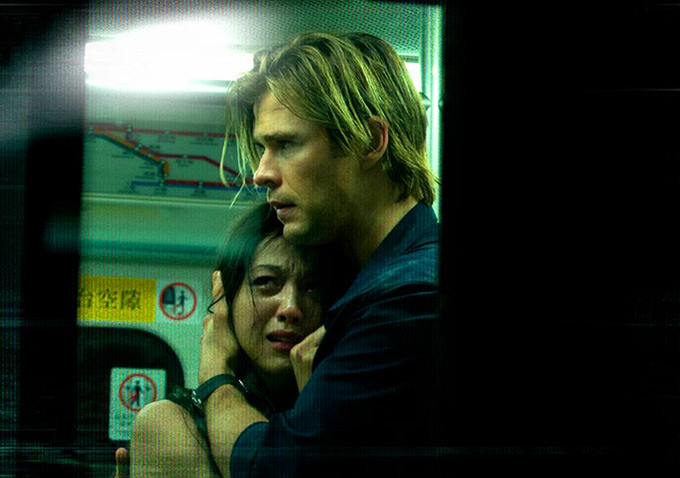Nicholas Hathaway has the name of a plutocrat with a stable of polo ponies, and the body of a movie superhero. The body part makes sense, since he’s played by Chris Hemsworth, who is the outlandishly sculpted Thor in Marvel movies and was recently chosen as PEOPLE‘s Sexiest Man Alive. Think of the young Brad Pitt, but pumped up, stripped down and hanging in a slaughterhouse. Sirloin beefcake.

The WASP moniker is to alert you that Nicholas, currently doing time in a federal penitentiary for cyberhacking, is a Hamilton Fish out of water. He keeps to himself, exercises in his cell and — to judge from his sheaf of books — is prepping for a Harvard correspondence course in 20th-century French philosophy. Living in what might be called voluntary solitary confinement, he is a Michael Mann kind of guy.
From his 1979 TV movie The Jericho Mile, about a Folsom lifer who runs at Olympic speeds around the prison yard, through the big-screen dramas Thief, Manhunter, Heat and Public Enemies and the innovative TV shows Police Story, Crime Story and Miami Vice, Mann has compiled a résumé that reads like a rap sheet. So often his protagonists are superior loners, bringing the dedication of high priests to jobs that happens to be illegal. Nicholas, in the new Blackhat, is one of these underworld aristocrats. Hemsworth may have the least likely physique for a genius hacktivist who spends much of his time typing — but, as any Mann production constantly reminds you, plausibility is for simps.

You might expect a cyberterror movie c. 2015 to trade in conspiracy theories about certain powerful or deranged Asian nations bolloxing U.S. Defense Department computers, but that’s not Mann’s way. Shooting a script by first-timer Morgan Davis Foehl, the director springs Nicholas from jail to send him and the Chinese-American brother-sister act Dawai and Lien Chen (Wang Leehom and Tang Wei) jetting from L.A. to Hong Kong, Indonesia and Malaysia in search of one rogue hacker with a nefarious scheme to… corner the world markets in soy and tin.

Blithely deflecting any audience anticipation of headline relevance or, really, human connection, Blackhat also abandons its own plot for long, closeup studies of bodies in rest or motion. The movie makes space for a romance between Nicholas and Lien, which it anatomizes in a series of languorous attitudes, like a Calvin Klein commercial without the briefs. (Tang Wei, who sizzled as the heroine of Ang Lee’s sexy drama Lust, Caution, is virtually invisible here.) The love scenes can’t match the erotic heat Mann applies to shots of the hackers’ traveling computer code. Those montages make malware a fashion statement: “our spring collection of malwear.”
Viola Davis — looking as if she were not cast in the role of Nicholas’s federal minder but sentenced to it — is replaced halfway through the film by the chief villain’s thugs: bad-guy character actors whose hard, gnarled faces hint at biographies more fascinating than those of the leads. The synching of words and lips is almost random, as if lines of dialogue had been rewritten in postproduction and dubbed in. The final chase scene involves deadly fights during a ceremony involving hundreds of people who pay no attention to the mayhem around them.
By this point, viewers will either give up or go with the slow flow, as if swimming through the most picturesque sludge. Surrender to the images and to the score (some of it by Atticus Ross, Trent Reznor’s collaborator on the most recent David Fincher films), which lends the murky proceedings a thrumming undertone that soothes as it menaces, like Gitmo Muzak. Blackhat is not so much a movie as a hallucination — which should please the Mann coterie and leave Hemsworth fans scratching their heads and biding their time for Avengers: Age of Ultron this May.
Source: time.com








